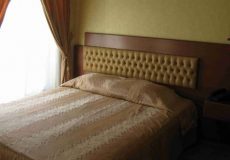
Double Room
- Max Guests:
- 2
- Max Kids:
- 1
Fardis Hotel Tehran is a clean and good quality two-star hotel in Tehran City. this hotel located near to National Jewelry Treasury and National Museum of Iran.
Hotel Located in No 1, Soheil Alley, Forsat Street. Tehran, Iran.
Distance to National Jewelry Treasury Tehran is 10 minutes walk (1.4 km)
Distance to Tabiat Bridge Tehran is 16 minutes by car (8 km)
Distance to Golestan Palace Tehran is 19 minutes by car (3.7 km)
Distance to Darband Tehran is 42 minutes by car (15.7 km)
Distance to Niavaran Palace Tehran is 35 minutes by car (17.7 km)
Distance to National Garden (Baq-e-Melli) Gateway Tehran is 16 minutes by car (3.1 km)
Distance to Milad Tower Tehran is 27 minutes by car (10.5 km)
Distance to Tehran Grand Bazaar Tehran is 26 minutes by car (5.3 km)
Distance to Sa’d Abad Palace Museum Tehran is 35 minutes by car (14.2 km)
Distance to National Museum of Iran Tehran is 13 minutes by car (2.7 km)
Distance to Azadi Tower Tehran is 26 minutes by car (7.8 km)
Distance to Valiasr Street Tehran is 15 minutes by car (4.9 km)
Booking with Persian Touring is so easy. Just choose your hotel and enter your date, the number of passengers and number of rooms. choose your room and fill the booking form. You will receive hotel availability and payment details very soon.
After your room availability confirms, you will receive a payment link with payment guide in your email address. after you done your payment, you will receive the Booking Complete notification in your email.
In your booking confirmation, you can see the hotel direct phone number. you can check it with the hotel
Actually, you can do it. But we don't write this information on our website for advertising reason.
Yes. Before payment done, you can decline your booking request without any charge.
automatically your booking request will cancel in this way.
Yes. We suggest you do this. Maybe you need this page in Visa Checking.
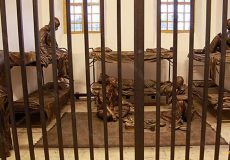
Qasr prison which used to be one of the famous prisons located in the heart of Tehran has been turned into a Museum since some years ago. Qasr Museum-Garden which was formerly called Qasr prison was Tehran’s first centralized prison. This prison is now inoperative and it is being visited by the public in the
MORE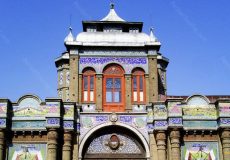
In the early 1330 AH, a tall gate was erected at the entrance to the former vicinity known as Maidan-e-Mashk. Thereafter a large portion of these lands came under national garden, therefore called Baq-e-Melli (National Garden). Presently this area is in the midst of Central Post Office of Tehran, Police Headquarter office and the registration
MORE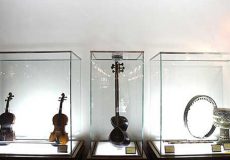
Saba museum is one of the museums of Tehran province and is related to Master Abul-Hassan Saba, the outstanding master of Iran’s music. Abul-Hassan Saba knew music composition other than playing instruments, also he had a good familiarity with Iran’s classic literature. This artistic museum is his personal house which according to his will was
MORE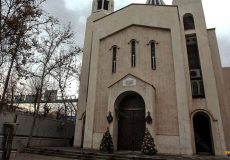
Saint Sarkis Cathedral or Saint Sarkis (Սուրբ Սարգիս մայր տաճար in Armenian) is the name of an Armenian church located on Karimkhan Zand Street at the beginning of Nejat Allah Street (previously Villa Street) in Tehran. Saint Sarkis Cathedral was established by personal expenses of an Armenian benefactor in Iran named Markar Sarkissian to the
MORE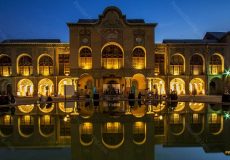
Masoudieh Palace is related to Qajar era and is located in Baharestan Square in Tehran. It was registered in the list of Iran’s national monuments on 27th of Dey 1377 with registration number 2190. Masoudieh Palace Garden was built in 1295 Hijri year to the order of Masoud Mirza, the governor of Isfahan known as
MORE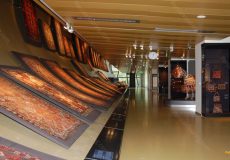
Carpet Museum is one of the museums in Tehran. This museum was built to the order of Farah Pahlavi and opened on 22nd of Bahman 1356. The building of the museum has an interesting architecture. Its exterior design is in the form of a carpet loom and the building is 3400 square meters which are
MORE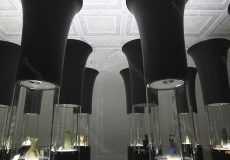
Glassware Museum is one of the museums in Tehran. The building is a historical house from Qajar period and is located in Thirty Tir Street in Tehran. This monument was registered in the list of Iran’s national monuments on 7th of Ordibehesht 1377 with registration number 2014. The building that is used today as the
MORE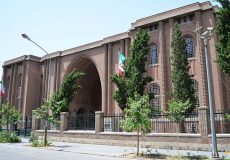
The National Museum of Iran lies in Tehran, and it is considered as one of its attractions. It consists of two separate buildings called “Ancient Iran Museum” (founded in 1937 AD) and “Museum of the Islamic Period” (founded in 1996 AD). Currently, the National Museum of Iran consists of 13 sections including pre-history, historical, Islamic,
MORE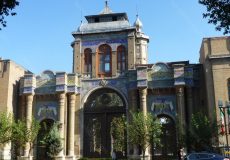
In the early 1330 AH, a tall gate was erected at the entrance to the former vicinity known as Maidan-e-Mashk. Thereafter a large portion of these lands came under national garden, therefore called Baq-e-Melli (National Garden). Presently this area is in the midst of Central Post Office of Tehran, Police Headquarter office, and the registration
MORE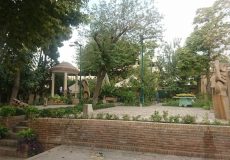
The Baharestan Palace, the ‘Howz-Khaneh’ of the old garden of Negarestan, the ‘Darolfonoon’ Edifice and ‘Negarestan‘ Edifice in Tehran. Top Hotels near to Negarestan and Howzkhaneh select Shiraz Hotel Tehran 25$ср / ночь select Markazi Hotel Tehran 26$ср / ночь select Khayyam Hotel Tehran 22$ср / ночь select
MORE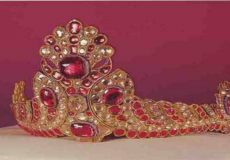
The incomparable “National Jewelry Treasury”, is a collection of the most expensive jewels of the world, collected over centuries. These jewels and rarities were decorations for the rulers during the past eras, and often showed the glory and extravagance of their courts, as well as their power and wealth. There is no information about the quality
MORE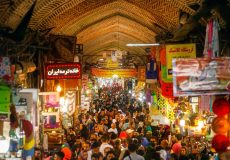
Tehran Grand Bazaar is a historical market situated in the capital of Iran, Tehran. Throughout its history, in addition to shops, the Grand Bazaar has contained banks and financiers, mosques and guest houses.a Tehran Grand Bazaar is so old. out of mind old. this bazaar. in the centuries following the introduction of Islam, travelers reported the growth of commerce
MORE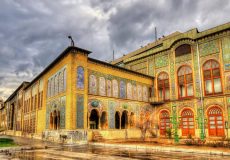
Golestan Palace, the magic of Qajar era and one of the oldest buildings in Tehran. a UNESCO sight. this is the sixteen UNESCO sight of Iran. the first section of the building was built in Safavid era. but in Qajar era, several building added to it and made a great complex for Qajars Kingdoms. in Pahlavi Era, the palace used for the political guest house. The
MORE
Get Social